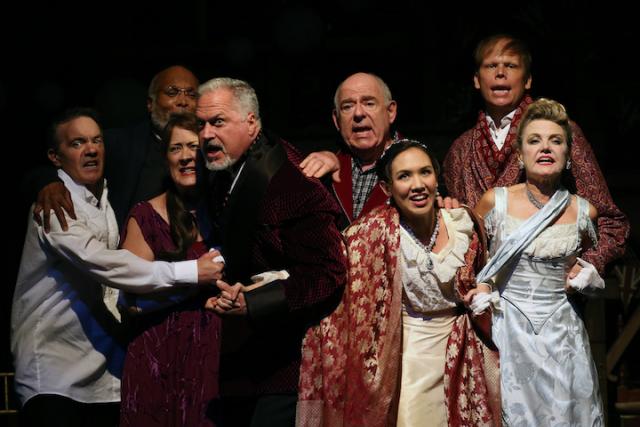
A snappy cast under David Staller's direction presents George Bernard Shaw's Heartbreak House as a delightful comedic romp but enough slashes of black and gray to be as pungent as Shaw himself. An anti-war/anti-political greed polemic in the form of a farce, Shaw wrote the play before World War I and re-re-wrote it for its first staging in 1920 when the horror of the war was no longer fresh in the public eye. The current production is timed for the pre-World War II days in London, the time when Hermione Gingold stepped off the cabaret revue stages and became a theater actress. According to Staller, this rendition of Heartbreak House refers back to the original staged version and has never been produced before. It is September 1940 and prepare to be greeted at the Lion Theater with 1940's posters and banners, piles of sandbags and Union Jacks strung on the wall. Inside, it is the Ambassador Theater in the midst of a revue before an air raid sent audience and cast to the basement shelter. Hoping to entertain the audience until the all-clear, the performers ask, "So let’s see, what can we offer you tonight? Do we have any acrobats, jugglers, singers?" With bombs and blackouts, it would be a frightening moment, except that Shaw turns the mood upside down with the threatening storm on the horizon. The cast decides to perform Shaw's Heartbreak House, tossed with some old-time sing-along favorites, like "Pack Up Your Troubles." (A Playbill insert contains words of the six songs, along with ads for Ovaltine, Hermione Gingold's favorite, and Ridgeways Tea.) Heartbreak House zeroes in on 1914 and the threatening days of an erratic world, a diatribe against war coached in wildly comedic situations with characters as eccentric as he was. Designed by Brian Prather, Heartbreak House itself is a welcoming villa in Sussex, packed to overflowing with a piano tucked so you can hardly see it, a wardrobe with gowns, feathers and veiled hats and a cluttered upper level. Owned by freewheeling Captain Shotover, it is a place where diverse visitors gather, bring their problems, ponder about their futures. There are no rules, class privileges are scoffed and social rules once accepted are now nonsense. Shotover, played with eccentric affability by Raphael Nash Thompson, is up in years himself, a sailor and inventor. He has two daughters. Running the inn at her father's command, Hesione Hushaby (Karen Ziemba), unruffled and the unbelievably tolerant wife of an unapologetic womanizer, the audacious Hector Hushabye (Tom Hewitt). Estranged from her family for years is self-absorbed Lady Ariadne Utterwood (Alison Fraser), who now suddenly appears, having left her no-good husband and surprised that no one recognizes her. Appearing early in the play Kimberly Immanuel playing Ellie, apparently an innocent designing young woman and acquaintance of Hesione. Ellie plans to marry a suspicious businessman with slick hair, Boss Mangan (Derek Smith), who had bamboozled her trusting father, Mazzini Dunn (Lenny Wolpe). Ellie is having problems with her plans to marry and why to marry at all although she quickly falls in love with the dashing Hector and later, with Randall, Lady Ariadne's husband who now loves Hesione. Randall is one of three parts played flamboyantly by Jeff Hiller. Ellie later solves her marriage problem with a surprising move that re-entangles everyone else's already interwoven lives. Oh, what a tangle web we weave... And in the distance, the sound of bombs is heard. Barbara A. Bell designs impressive costumes for the cast that speak for them. Note Lady Ariadne's gown, lush and expensive. Hesione, the practical sister, wears deep confident red. Hector, played with vainglorious flair by Hewitt poses and relishes in fine tailoring. All have the demeanor that helps define their characters. Slapping on an apron gives a hilarious touch to Hiller as the maid, Guinness, one of his three parts. The first act has sluggish moments, taking time to pick up the pace again. The second act, as well, stalls in the final untangling of various love affairs, marriages and non-marriages. Yet, in all, in this time, David Staller brought out the relevancy of G.B. Shaw's diatribe against war couched in hilarity and eccentric characters and, in the distance, the threat of disaster. He has managed to direct the crazy comedy, making the mix of undesirables and self-involved ambitions, and the threat of disaster in the distance clearly relevant. G.B. Shaw was an eccentric, provocative observer of the late 19th century who wrote prodigiously about what he saw and what he felt. He was a humanist, embracing free love, contraception, and human and animal rights, using his rapier controversial ideas and witty articulation to communicate his controversial ideas through his plays. He said, "Whether it be that I was born mad or a little too sane, my kingdom was not of this world: I was at home only in the realm of my imagination."
